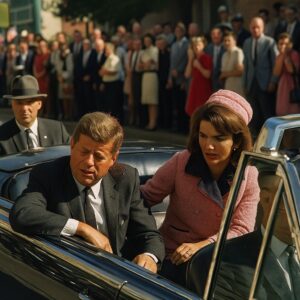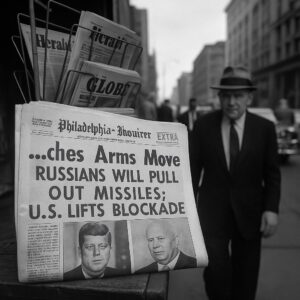On November 29, 1947, the world watched as the United Nations General Assembly cast one of the most consequential votes in modern geopolitical history. Resolution 181, the plan to partition Palestine into separate Jewish and Arab states with Jerusalem placed under international administration, became a watershed moment in the conflict that continues to shape the …
Category: Events
The Day Ireland Stood Alone: The Historic Departure of British Troops in 1922
On December 7, 1922, Ireland witnessed a moment that generations had fought for, dreamed of, and died believing would one day come to pass. After more than seven centuries of British rule, the last British troops marched out of the country, marking a profound turning point in Irish history and symbolizing the beginning of a …
The Accidental Arcade Revolution That Launched a Global Gaming Empire
In the early 1970s, long before video games became a cultural force woven into the fabric of everyday life, the idea of an interactive electronic pastime was more curiosity than commodity, more technical experiment than meaningful entertainment. Few people outside a handful of engineers and dreamers could have predicted that a small company founded by …
How the Red Cross Was Born in Geneva and Changed Humanity Forever
The story of the Red Cross begins in a place that feels almost symbolic when you look back at how everything unfolded—Geneva, a city surrounded by the calm waters of Lake Geneva and the quiet dignity of the Swiss Alps. Today, Geneva is known as a hub of global diplomacy and humanitarian ideals, but in …
How Panama Broke Free: The Global Power Struggle That Created a Nation
In the late 19th century, the Isthmus of Panama was a highly coveted stretch of land, linking the Atlantic and Pacific Oceans and serving as a critical route for international trade. The idea of constructing a canal across Panama—an engineering feat that would one day transform global commerce—had been discussed among world powers for decades. …
How the First Nobel Prizes in Stockholm Changed the World Forever
The story of the first Nobel Prizes awarded in Stockholm is not just the tale of a ceremony or the recognition of a few brilliant individuals; it is, at its heart, the story of a world standing at the threshold of a new century and trying to define what progress, virtue, and human achievement truly …
A New American Machine Age: How Ford’s Model A Reignited the Road
The moment the Ford Motor Company introduced the Model A, America was a nation caught between the weight of a fading past and the thrilling promise of a future that seemed to unfold faster than anyone could quite comprehend. The automobile had already begun reshaping lives by the 1920s, but it was the arrival of …
The Assassinations of Harvey Milk and George Moscone
The story of Harvey Milk and George Moscone’s assassinations in San Francisco is one of those moments in American history when the air seemed to shatter—when hope, long fought for and only newly born, was suddenly pierced by violence. And yet, like all such turning points, the tragedy did not end with the sound of …
The Night Mumbai Stood Still
There are moments in history when a city seems to inhale sharply, as if bracing itself against something too large, too violent, too unfathomable to fully understand until long after the smoke clears. Mumbai, a city that has seen monsoons, colonial rule, financial collapses, power outages, political upheavals, and its share of heartbreak, had always …
Marconi’s First Radio Broadcast Launched the Wireless Age
The story of the world’s first radio broadcast by Guglielmo Marconi is the kind of moment in history that feels almost mythic when you think about what it would eventually unlock. At the time, no one fully understood just how enormous the implications would be, not even Marconi himself, although he certainly had more confidence …
The Missouri Morning That Gave Us Mark Twain
Samuel Langhorne Clemens entered the world on November 30, 1835, in a small, unassuming house in the quiet village of Florida, Missouri—a place so modest that even today it feels more like a footnote than a birthplace of literary greatness. When he was born, few could have imagined that this fragile, premature infant would grow …
Alfred Nobel’s Final Will Transformed the World
Alfred Nobel’s decision on November 27, 1895, to sign his last will and testament inside the Swedish–Norwegian Club in Paris would become one of the most influential acts of personal philanthropy in human history. It is almost breathtaking to think that one quiet moment, tucked away in a modest room and witnessed by just four …
George Washington Shaped America’s Tradition of Gratitude
What we now call Thanksgiving has grown so deeply into the American experience that it’s easy to forget it didn’t begin as an annual, unquestioned holiday. It began with a moment. A proclamation. A leader who understood that a country as new, fragile, and untested as the United States needed more than laws and battles …
Panama’s Bold Break from Empire: The Untold Story of a Quiet but Powerful Independence
Panama’s declaration of independence from Spain on November 28, 1821, stands as one of the most fascinating and understated independence movements in Latin American history. Unlike the sweeping battles that defined the struggles of nations like Mexico, Peru, and Colombia, Panama’s liberation was—incredibly—accomplished without bloodshed. It was a revolution of planning, persuasion, diplomacy, and sheer …
When Casablanca Captivated the World the Night a Legend Premiered in New York
On November 26, 1942, in the middle of a global war that was reshaping the world map, rewriting destinies, and redefining what humanity thought it understood about itself, something quietly remarkable happened in New York City. It didn’t happen on a battlefield or in a strategy room or in the smoke-filled offices of wartime diplomats. …
How the Last British Troops Left New York and Closed the Revolutionary Era
On November 25, 1783, something happened in New York City that would echo far beyond the streets, harbors, and fortifications that framed the moment. It was not a battle, nor a treaty signing, nor a soaring speech delivered from the steps of a grand building. It was, in a sense, the opposite: an ending, a …
The Book That Reshaped the World: How Darwin’s ‘Origin of Species’ Sparked a Revolution in Human Understanding
When Charles Darwin published On the Origin of Species on November 24, 1859, he did far more than release a scientific book—he detonated an intellectual earthquake whose aftershocks continue to shape every corner of modern thought. It is difficult today, in a world where evolution is a familiar concept taught in classrooms and taken for …
The Man Who Became Many: How Thespis of Icaria Became the World’s First Actor
When we imagine the origins of theater, it’s tempting to picture enormous marble amphitheaters, flowing robes, and poetic monologues echoing across ancient Greek hillsides. But long before theater became the cultural force we now study, celebrate, and imitate, there was a moment when it did not yet exist in any recognizable form — a moment …
The Night Doctor Who Stepped Onto Television History
On a fog-filled November evening in 1963, British television quietly changed forever. The moment itself didn’t arrive with fireworks or prestige or any of the pomp that would later surround the cultural phenomenon it became. Instead, it slipped into the BBC’s broadcast lineup nestled between educational programming and the tail end of children’s shows, a …
The Day the Music Stood Still: Remembering Freddie Mercury’s Final Curtain Call
On November 24, 1991, the world lost one of its most electrifying, genre-defying, impossible-to-duplicate performers. Freddie Mercury didn’t just sing songs—he detonated them across stadiums, across cultures, across generations. By the time of his death, he had already become larger than life, but strangely enough, he never seemed to realize how staggering his influence was. …
When Earth First Revealed Its Colors: A New Perspective from Space
The first color photograph of Earth taken from space is one of those rare moments in human history when technology, curiosity, and sheer wonder converge into a single image that changes how we see ourselves. Before that moment, our understanding of Earth was rooted almost entirely in maps, globes, paintings, and imaginations shaped by the …
The Day America Lost Its Innocence
On November 22, 1963, the world seemed to slow its breath, as if instinctively sensing that something irreversible was about to occur. President John Fitzgerald Kennedy—young, charismatic, endlessly symbolic of a new American era—arrived in Dallas that morning with the kind of optimism that had become synonymous with his administration. The sun shone brightly on …
Spain Joins the Alliance: How NATO Membership Redefined a Nation’s Future
When Spain formally joined NATO on May 30, 1982, it marked far more than a diplomatic shift or a treaty signature. It was a moment when a country emerging from decades of dictatorship finally stepped onto the world stage ready to claim its place among modern democracies. For Spain, NATO membership symbolized legitimacy, stability, and …
How the BBC’s First Regular TV Service Transformed Home Life Forever
When the British Broadcasting Corporation officially launched the world’s first regular public television service on November 2, 1936, most people had no idea they were standing at the edge of a technological revolution. At the time, television wasn’t yet a household word. It sounded futuristic, almost whimsical—like something written into a science-fiction novel or imagined …
How the Mayflower Compact Became America’s First Self-Government Agreement
When forty-one men aboard the Mayflower dipped their quills into ink on November 11, 1620, they were not thinking about textbooks, future democracies, or the birth of a nation. They were thinking about survival. Cold winds whipped across the deck. The smell of damp wood, sickness, and exhaustion clung to the ship. Many passengers were …
The Historic Opening of the Nuremberg Trials
On November 20, 1945, as a cold Bavarian morning settled over the battered city of Nuremberg, something unprecedented in the history of human civilization began. In a courtroom carved out of the ruins of a recently defeated empire, the world gathered to hold individuals—not nations, not vague entities, not faceless regimes, but actual men—accountable for …
When the World Finally Breathed Again: The Day the Cuban Missile Crisis Ended
On October 28, 1962, after thirteen days of fear that wrapped around the world like a tightening wire, the Cuban Missile Crisis formally came to an end. It was a quiet ending—no parades, no applause, no triumphant speeches echoing from balconies or podiums. Just a few careful statements, diplomatic signals, and tense, weary exhalations from …
Windows Changes Everything: How Microsoft’s Windows 1.0 Launch Transformed Personal Computing Forever
When Microsoft officially launched Windows 1.0 on November 20, 1985, the world didn’t immediately realize it was witnessing the beginning of a technological revolution. In fact, many critics shrugged. Some mocked it. Others doubted it would last even a few years. But history would prove something different—something astonishing. This seemingly modest release, bundled into a …
The Discovery That Redefined the Edge of Our Solar System
On June 22, 1978, in a quiet, windowless office at the U.S. Naval Observatory in Washington, D.C., an astronomer named James Christy noticed something peculiar on a photographic plate that would eventually reshape the way we understood our solar system. At first, it didn’t look like anything groundbreaking—just a slightly elongated blob where Pluto should …































